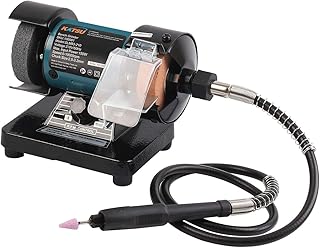Tool Grinder: Difference between revisions
From DT Online
mNo edit summary |
mNo edit summary |
||
| (One intermediate revision by the same user not shown) | |||
| Line 1: | Line 1: | ||
[[File:BenchtopGrinder.png| | [[File:BenchtopGrinder.png|300px|right]] | ||
__TOC__ | |||
A [https://en.wikipedia.org/wiki/Bench_grinder '''Benchtop Grinder'''] is commonly used for tool sharpening - especially drills and lathe tools. The grinding wheel is usually made from [https://en.wikipedia.org/wiki/Silicon_carbide '''Carborundum'''] bonded together by [https://en.wikipedia.org/wiki/Sintering '''Sintering''']. <span style="color: red">The wheels are very brittle and if not mounted correctly, or abused in use, they can burst into fragments and cause serious injury.</span> | |||
=====Description===== | |||
A [https://en.wikipedia.org/wiki/Bench_grinder '''Benchtop Grinder'''] is commonly used for tool sharpening - especially drills and lathe tools. The grinding wheel is usually made from [https://en.wikipedia.org/wiki/Silicon_carbide '''Carborundum'''] bonded together by [https://en.wikipedia.org/wiki/Sintering '''Sintering''']. | |||
---- | |||
<span style="color: red">'''Safety Point!''' | |||
The wheels are very brittle and if not mounted correctly, or abused in use, they can burst into fragments and cause serious injury. | |||
</span> | |||
---- | |||
A '''Green Grit''' grinding wheel is needed when sharpening [https://en.wikipedia.org/wiki/Tipped_tool '''Tungsten Carbide Tipped (TCT)'''] tools. | A '''Green Grit''' grinding wheel is needed when sharpening [https://en.wikipedia.org/wiki/Tipped_tool '''Tungsten Carbide Tipped (TCT)'''] tools. | ||
=====Features and Applications===== | |||
Tools should be dipped frequently in water to keep them cool during the grinding operation to avoid over-heating and [https://en.wikipedia.org/wiki/Tempering_%28metallurgy%29 '''''drawing the temper''''']. | Tools should be dipped frequently in water to keep them cool during the grinding operation to avoid over-heating and [https://en.wikipedia.org/wiki/Tempering_%28metallurgy%29 '''''drawing the temper''''']. | ||
| Line 34: | Line 45: | ||
Finally, tools requiring a particularly keen edge ''(e.g. [https://en.wikipedia.org/wiki/Scalpel '''Scalpels'''] may be finished by [https://en.wikipedia.org/wiki/Razor_strop '''Stropping''']). | Finally, tools requiring a particularly keen edge ''(e.g. [https://en.wikipedia.org/wiki/Scalpel '''Scalpels'''] may be finished by [https://en.wikipedia.org/wiki/Razor_strop '''Stropping''']). | ||
{{Tool Grinder Buyers Guide}} | |||
[[Category:Secondary]] | [[Category:Secondary]] | ||
[[Category:Bench Top Equipment]] | [[Category:Bench Top Equipment]] | ||
Latest revision as of 09:57, 29 May 2017

Description
A Benchtop Grinder is commonly used for tool sharpening - especially drills and lathe tools. The grinding wheel is usually made from Carborundum bonded together by Sintering.
Safety Point! The wheels are very brittle and if not mounted correctly, or abused in use, they can burst into fragments and cause serious injury.
A Green Grit grinding wheel is needed when sharpening Tungsten Carbide Tipped (TCT) tools.
Features and Applications
Tools should be dipped frequently in water to keep them cool during the grinding operation to avoid over-heating and drawing the temper.
Milling Cutters and other complex tools are most effectively sharpened using a Tool and Cutter Grinder
Safety Point! All workshop machines can be dangerous - do not use any machine until you have been trained to do so. Wear eye protection and never grind on the side of the wheel. Grinding wheels should be fitted only by a competent person following manufacturer's instructions.
Note: Bench Grinders should never by used for softer metals such as Aluminium (but they may be used to shape Acrylic sheet without detriment to the wheel - but care must be taken to clear away waste frequently to avoid ignition).

Although woodworking edge tools can be sharpened on a Benchtop Grinder, even greater care must be taken to avoid over-heating the tool. Traditionally a slowly revolving and water lubricated Grindstone made from natural sandstone was used, as can be seen on old illustrations, but modern powered benchtop versions are now available complete with a tange of attachments to ensure repeated accuracy.
After Grinding sharp edge tools must then be Honed using an Oilstone, Whet Stone or Sharpening Steel (commonly used by butchers for Knife Sharpening).
More recently, sharpening stones and steels have incorporated Diamond as the abrasive grit.
Finally, tools requiring a particularly keen edge (e.g. Scalpels may be finished by Stropping).
- A range of tool grinders and sharpeners is given but few machines are fully automatic and users must take care to follow instructions exactly, look up grinding angles before use and keep the tool well cooled by frequent dipping into a coolant in order to avoid drawing the temper by over-heating.








